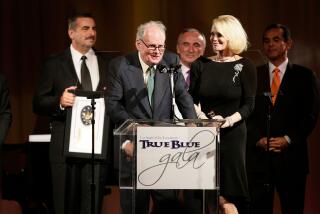William T. Golden, 97; wealthy investor influenced the nation’s study of science
- Share via
William T. Golden, an influential behind-the-scenes force with many of the nation’s prominent scientific research institutions who conceived the idea of a presidential science advisor, died Sunday of lymphoma at Mount Sinai Medical Center in New York. He was 97.
Golden, who earned a fortune in the 1930s through canny Wall Street investments, spent more than 50 years bringing the foremost minds of science together with presidents, mayors and international leaders.
After working as an official at the Atomic Energy Commission in the late 1940s, Golden became a consultant to President Truman in 1950 and recommended that he hire a scientist to monitor the nation’s research efforts. Every president since has had an official science advisor.
Golden also helped launch the National Science Foundation, an independent federal agency that has grown since its founding in 1950 to become a major source of funding for scientific research in the nation.
Golden was a key boardroom figure at and financial supporter of nearly 100 medical schools, museums, universities and other institutions, including the National Academy of Sciences, the Carnegie Institution for Science and the American Assn. for the Advancement of Science.
“He’s an icon in the American scientific community,” said Alan I. Leshner, the science association’s chief executive. “There isn’t a leader in American science who doesn’t know who this guy is. In his ability to affect science and public policy, I can’t think of a single individual who has been more influential.”
He had an endless network of high-placed acquaintances and discussed science policy with such world figures as Albert Einstein, Al Gore and the Dalai Lama. In recent years, Golden organized summits of the top science ministers of the Group of Eight major industrial nations.
The informal assembly, dubbed the Carnegie Group, met twice a year with no staff members, no agenda and no written minutes. Golden was the only private citizen allowed to attend.
William Theodore Golden was born in New York on Oct. 25, 1909. He was fascinated by science and became a ham-radio operator at age 13 in 1922, when radio was in its infancy.
Realizing that his limited talent for mathematics would keep him from becoming a physicist, Golden studied English and biology at the University of Pennsylvania, from which he graduated in 1930. After a year of graduate study at Harvard Business School, he became a Wall Street trader and was a wealthy man within 10 years.
“The idea was to make a lot of money on Wall Street and then do interesting things,” Golden once said.
He continued to serve on various corporate boards and to have a substantial income from investments for the rest of his life. In 1979, Golden received a master’s degree in biology from Columbia University.
During World War II, he served in the Navy and invented a firing device for antiaircraft guns. After the war, he joined the Atomic Energy Commission at its inception in 1946, working for $1 a year, and began his quest to push science and education onto the national agenda.
In 1989, Golden bought 3,800 acres of the Black Rock Forest north of New York and turned the land into an outdoor science and environmental laboratory.
His first wife, Sibyl Levy Golden, died in 1983. A second marriage, to Jean Taylor, ended in divorce. Survivors include his wife of less than a year, Catherine Morrison of New York; and two daughters from his first marriage, Sibyl Golden of New York and Pamela Golden of Tucson.
More to Read
Sign up for Essential California
The most important California stories and recommendations in your inbox every morning.
You may occasionally receive promotional content from the Los Angeles Times.












